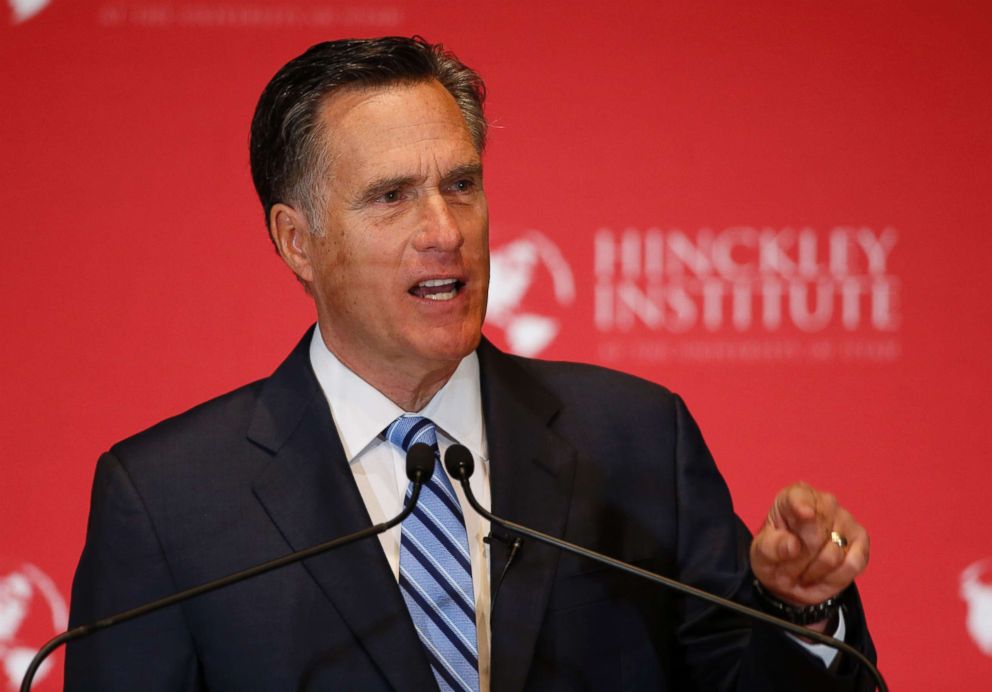The Note: Democrats take power as Trump’s hand grows weaker
The easy part of governing during the Trump presidency is over. Yes, really.
The TAKE with Rick Klein
The easy part of governing during the Trump presidency is over. Yes, really.
Noon on Thursday opens a new chapter for President Donald Trump and the Washington scene he’s come to dominate.

It comes at something of a low point for Trump, who faces growing concerns inside his party, including those most vocally expressed by Mitt Romney, the incoming junior senator from Utah. The Republican Party as a whole, meanwhile, relinquishes power in the House in the middle of a prolonged government shutdown.
When Rep. Nancy Pelosi takes the speaker’s gavel once again, united GOP control of Congress evaporates. With it goes perhaps the biggest piece of Republican leverage in obtaining Trump’s signature campaign promise of a border wall -- the reason for the shutdown that Trump says “could be a long time.”
Democrats will face significant challenges in seeking to govern without control of the White House and keeping the party united as the presidential campaign heats up.
But their initial tasks will include signaling opposition to Trump and voting to reopen the government. Trump may be right that this is not how Pelosi saw her speakership starting, though it’s certainly not how Paul Ryan saw his speakership ending.
Upon accepting the gavel, Pelosi plans to specifically cite the diversity of the new freshman class.
“When our new members take the oath, our Congress will be refreshed, and our democracy will be strengthened by the optimism, idealism and patriotism of this transformative freshman class,” according to excerpts from her speech, released by her office. “Working together, we will redeem the promise of the American Dream for every family, advancing progress for every community.”
The RUNDOWN with MaryAlice Parks
Progressives in the Democratic Party decided to back Pelosi as the new speaker, but on this very first day of the party’s new majority, a handful plan to vote against one of her first bills.
Normally, votes on the rules packages are pro forma, just parameters dictating how its committee will operate and legislation will be regarded.
But Pelosi and her team are proposing a rules package that includes one prickly provision, wherein no bills may be considered if they are not specifically budget neutral.
That’s bothersome to a few seeking to pass sweeping increases to government spending.

For example, some Democrats want to plant a flag with high price-tag legislation on infrastructure, renewable energy and universal health care coverage. Those costly bills would likely fail in the Republican-controlled Senate, but they could serve as negotiating tools.
Incoming Democratic chairs say the controversial rule could be waived, if needed. Republicans, after all, waived the rule to pass their expensive changes to the tax code.
Plus, the leadership argues, the left got some big wins overall, including changes to which tax bills could be evaluated and a Select Committee on the Climate Crisis.
But if rules may be waived, why have them at all, others say? And remember Congress appropriates money in some bills and works on taxes in others, meaning that in practice legislation is rarely written so line-for-line, pay-for-spend items directly correspond.
The TIP with Adam Kelsey
Sen.-elect Romney will be sworn in on Thursday having created a fair deal of fresh buzz around himself and sparking the question -- even from the president -- of whether he will act as another Sen. Jeff Flake.
But the president may consider himself fortunate if that turns out to be the case, given that despite frequent disagreements Flake voted with the White House over 81 percent of the time in the last two years, according to a FiveThirtyEight analysis. And Romney hinted as much in a CNN interview on Wednesday, saying he wouldn't "cut off [his] nose to spite [his] face" "just to be tough on the president," and that he's with Republicans on the ongoing shutdown standoff.

The GOP’s slim Senate majority, particularly at the committee level, means that Romney could potentially hold pieces of legislation hostage, if he so chooses. He will receive his committee assignments Thursday. But despite a scathing Washington Post op-ed, his CNN appearance made it clear that the Republican agenda remains his priority.
However, the political calculus could change at any moment. If Trump were to cross a moral red-line or if the freshman senator was to decide he wants to step out from the bottom his new chamber’s totem pole, Romney’s political experience and an already Trump-phobic constituency could lead to actions that quickly prove he’s a bigger threat to the administration than “a Flake.”
THE PLAYLIST
ABC News' "Start Here" Podcast.
Thursday morning’s episode features ABC News Senior National correspondent Terry Moran, who explains why both sides of the aisle are still at odds over resolving the partial government shutdown. Then, ABC News Senior Congressional correspondent Mary Bruce previews what divided government will look like when Nancy Pelosi assumes her presumptive post as Speaker of the House later Thursday. http://apple.co/2HPocUL
WHAT YOU NEED TO KNOW TODAY
The 115th Congress will conclude in a pro forma session on the House floor at 11 a.m.
U.S. Senators will be sworn in at noon in the Senate chamber. A re-enactment of the swearing-in will be held in the Old Senate Chamber at 1 p.m.
Members of the U.S. House of Representatives 116th Congress will be sworn in on the House floor at 2:30 p.m.
The Note has a new look! Download the ABC News app and select "The Note" as an item of interest to receive the day's sharpest political analysis.
The Note is a daily ABC News feature that highlights the key political moments of the day ahead. Please check back tomorrow for the latest.




